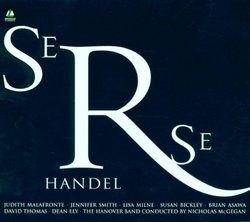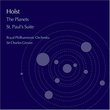| All Artists: George Frideric Handel, Nicholas McGegan, The Hanover Band, Jennifer Smith, Lisa Milne, Susan Bickley, Brian Asawa, David Thomas, Judith Malafronte, Dean Ely Title: Handel - Serse / Malafronte, J. Smith, Milne, Bickley, Asawa, D. Thomas, Ely, McGegan Members Wishing: 0 Total Copies: 0 Label: RCA Release Date: 4/13/1999 Album Type: Box set Genre: Classical Styles: Opera & Classical Vocal, Historical Periods, Baroque (c.1600-1750) Number of Discs: 3 SwapaCD Credits: 3 UPC: 756055131229 |
Search - George Frideric Handel, Nicholas McGegan, The Hanover Band :: Handel - Serse / Malafronte, J. Smith, Milne, Bickley, Asawa, D. Thomas, Ely, McGegan
 | George Frideric Handel, Nicholas McGegan, The Hanover Band Handel - Serse / Malafronte, J. Smith, Milne, Bickley, Asawa, D. Thomas, Ely, McGegan Genre: Classical
|
Larger Image |
CD DetailsSimilar CDs |
CD ReviewsGreat Opera, but Missing the Drama Don G. Evans | Randallstown, MD USA | 11/22/2000 (4 out of 5 stars) "Serse has been one of my favorite Handel operas since I first heard the old Priestman LP on Westminster (Maureen Forrester in the title role, Lucia Popp as Romilda). Despite its frequent raggedness and "harpsichord on speed" continuo, this was a thoroughly dramatic and engaging performance. I've waited for decades for a new Serse which could benefit from the new performance standards we take for granted in baroque opera today. I was strongly disposed to like this disc, since although I've found McGegan a bit uneven in the past, his more recent Handel efforts, particularly Radamisto, have been superb. I can't fault the singers or orchestra in this performance, but the dramatic spark that makes Serse so special seems to me to be missing. I went back and compared my old Priestman recording and was even more convinced that the definitive Serse is yet to come. It's surprising there haven't been more recordings, since this work has a lot of potential appeal, and is one of Handel's most accomplished pieces. Maybe I'm just too picky, but I'd love to see someone reissue the Priestman on CD-- and while they are at it, his equally engaging Rodelinda (fortunately, there is better competition for the latter)." Don't miss! hcf | 06/26/2000 (5 out of 5 stars) "I've heard several Handel operas under McGegan (both live and on disc) and this may well be my favorite. It has all the elements of McGegan's style - elegance, quickish tempos, perfect rapport with the singers, and more - the performance actually highlights the element of humor in the opera's libretto. Serse may not be a comedy in the modern sense of the word (the term "melodrama" would fit better), but it is nevertheless quite different stylistically from Handel's earlier "heroic" operas. Serse is styled as a mixture of recitative and arioso, with the dramatic action spilling over from the recitatives into many of the ariosos and arias - this was an unusual feature by opera seria standards: in opera seria, arias were usually employed to express emotion rather than action. Most arias in Serse are also shorter than in opera seria (often without da capo). The characters in Serse are usually a mixture of farce and tragedy, with only one wholly buffonic figure - Elviro. What is truly ironic about Serse is that it was unsuccessful in Handel's times, but now, of course, it is one of the best known and best loved Handel operas. The singers here are almost uniformly wonderful. I may have preferred Serse sung by a countertenor but Judith Malafronte offers a convincing account of the role. Her singing is not entirely free from vibrato but it is never out of control. David Thomas shows an amazing vocal versatility as Elviro - his character is hilarious! Lisa Milne and Dean Ely are both good as Atalanta and Ariodate, respectively. Susan Bickley as Amastre offers a delightfully focused, bright tone, quite unlike the wooly sound you might expect from a mezzo-soprano. Her "Or che siete speranze tradite" is superb. Brian Asawa as Arsamene is an absolute winner: his mezzo-soprano voice is astonishingly beautiful (without a trace of artifice) and his embellishments are the most imaginative of the whole cast. His "Amor, tiranno Amor" is a gem by any standards! The only bad news is Jennifer Smith - once a marvelous singer, she appears to be past her prime. I found her pinched singing to be difficult to enjoy. But don't let that stop you from buying this otherwise remarkable recording." A baroque beauty F. Behrens | Keene, NH USA | 05/17/1999 (5 out of 5 stars) "The operas of the Baroque period are enjoying a comeback on CDs with lovers of jazz especially appreciative of the melodic twists and turns of Rameau, Handel and the rest. To many of us, the endless da capa arias of the latter prove tiresome, albeit quite lovely; and the plots are laughably negligible. But Handel's "Serse" (Xerxes, that is) is exceptional in that its arias are closer both to the earlier forms of opera and the later ones in which the da capa was not used. With the "authentic instruments" of the Hanover Band under Nicholas McGegan, this recording on BMG 75605 51312 2 enjoys a solid cast: Judith Malfronte in the title role, Jennifer Smith, Lisa Milne, Susan Bickley, and others. If you want at least one Handel opera in your collection, this might very well be it."
|

 Track Listings (38) - Disc #1
Track Listings (38) - Disc #1